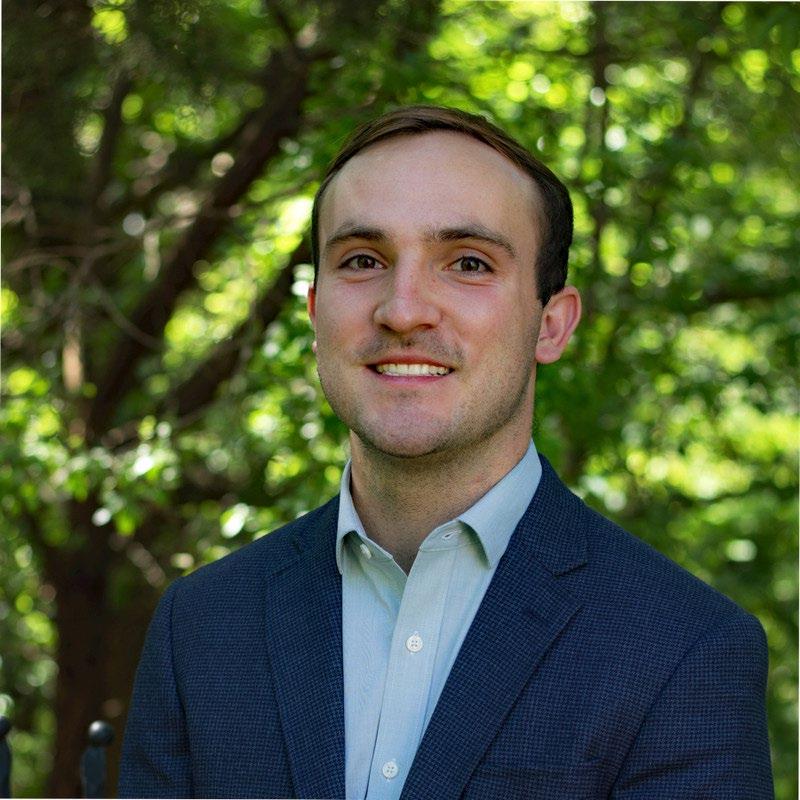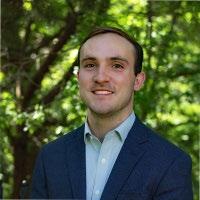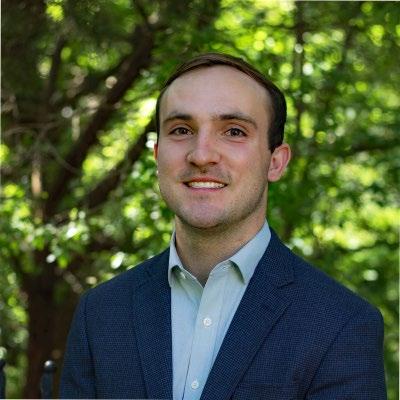
6 minute read
Q&A with Dr. Brian Jermain
Currently, Dr. Jermain is a Pharmacometrician at Pfizer and has been with the company since August 2021. After graduating from the University of Texas at Austin with his PharmD, he completed a two -year postdoctoral fellowship in Pharmacokinetics/Pharmacodynamics (PK/PD) at the University of North Carolina Chapel Hill.
Dr. Jermain
Advertisement
Tell me what your typical workday is like as a Pharmacometrician?
A typical day as a Pharmacometrician is variable. For the most part, there are around 2-3 hours of meetings to discuss PK analysis or any data generated. The remainder of the day is largely academic, where I’m strictly doing data analysis and creating the PK/PD models using R, NONMEM, and other programs. Other times, I’m reading literature to better understand the modeling landscape and other background research needed.
As a Pharmacometrician, we work closely alongside Clinical Pharmacologists to use the PK/PD data to provide insight and lead strategy in terms of drug dosing, drug interactions, and protocol development.


What soft skills would a PharmD need to be successful in a Pharmacometrics role or industry, in general?




The two soft skills I find important are communication and flexibility. Oftentimes, you need to translate the niche terminology of your project so that your audience can understand why it’s important and what your project can accomplish. Since you also work in a multidisciplinary team, communication is needed to be able to work together effectively. In these teams, people may often not understand the full extent of your abilities, so it’s your responsibility to understand your role in the group and voice where you can provide value.
It’s also good to be flexible, especially with time and your goals. There are times the FDA requires an immediate submission of additional work, which can disrupt your carefully planned schedule. I remember to keep cool and acknowledge that things come up and change. In industry, change is the norm, so it’s good to be adaptable.
What projects did you work on during pharmacy school? How did you prepare for those and make the most out of it?
I was more involved in organizations and leadership than I was in any research projects. There weren’t any opportunities to do PK-related research at the time, so I mainly taught myself and gained new skills that were applicable to my career. For instance, I learned R before applying to pharmacometric-related fellowships.


I did have APPE rotations at Pfizer in Medical Affairs and at PPD (Pharmaceutical Product Development) in clinical trials. My other APPE projects included helping a pharmacy resident at Baylor Scott and White with an infectious disease-related review.

In terms of maximizing your experiences, I took on more challenges and established clear goals of what I wanted to get out of it. The more experiences you get in your rotations, organizations, or life in general, the more you can speak about during your post-graduate interviews. You really just have to put yourself out there, even if it’s awkward at first.

The quicker you can identify something you’re interested in, the better since you can challenge yourself and get out of your comfort zone. You’ll never have all the answers to everything, so don’t be afraid to ask for help along the way. There’s a lot less external pressure than you think!



What was your fellowship application process like? What makes a good candidate for these cycles?
My fellowship interviews were in person at Midyear, though some of them are hybrid now. Midyear would happen the first week of December and you would expect any offers after the new year.

My advice is to do the background research of the fellowships you’re applying to and talk to current fellows to see if you can envision yourself happily in those positions. There’s so many functional areas, so hone in on the program, company, and area you’re interested in.






Once you’re at the interview, be prepared for any situational and behavioral-based questions. Towards the end, ask meaningful questions that you cannot find online to show that you’re invested in the position. Be comfortable presenting since, if you make it far enough, you may do a 10-20 minute presentation over a project or something related.
The best thing to do is to be genuine and be able to speak about your experiences that show you have aspirations and are genuinely invested in what you do. Overall, it’s really nice to see a genuine applicant that finds a way to be themselves, especially during a stressful interview.
After you meet with the team and the company, I would rank your fellowships based on where you’re going to be most supported, since your team and manager can dictate your experiences. At the end of the day, industry experience is industry experience regardless if it’s at a big or small company, so rank the environments you see yourself best working in the highest.
For those who did not receive a fellowship this application cycle, what is your best advice for them if they are still interested in pursuing industry?
Depending on the company, there are certain positions and opportunities available for graduates without a fellowship. You have to use your network and IPhO to find those positions and ensure it matches with your abilities and skills. Getting into industry is the hardest part since, although positions may be available, that doesn’t guarantee you’d make a good match.

Though once you get your foot in the door, it’s easier to move around. You’ll have conversations with your manager about career aspirations, and you should choose a company that values your goals. You’re probably not going to be in the same role for the rest of your life, so choose a company that will support your growth and future plans.
As young leaders, we are often encouraged to say “yes” to opportunities. When was a time you said “yes” to a big risk in your career? Do you have any advice on how to graciously say “no?” brian.jermain@pfizer.com
Telling people “no” politely is important because you don’t want to get trapped under unreasonable expectations. My mom advised me that rather than just leaving it at “no,” offer alternate options on what you can do instead. You should be able to compromise and meet in the middle.




My biggest risk was taking on leadership positions. I tend to be more reserved, but you learn different types of leadership when you put yourself out there. The more time you spend in these positions, the more comfortable you’ll be contributing in meetings and leading discussions. Leadership is not always steering conversations but contributing where you can provide value, so you can understand the skill of stepping both in and out of the leadership role. When it comes to gaining a position, you don’t have to shoot for the highest one, like President or VP. Get involved, even if it’s in a subgroup, to gain that experience and get comfortable with leadership.
How did you use your leadership experience to navigate any obstacles and establish yourself as an effective leaders within Pfizer today?

With my positions in Phi Delta Chi, IPhO, and Rho Chi, I learned how to balance many things at once. I had to be flexible in order to get everything done, and the biggest skill that helps me today is planning ahead. Even if your schedule changes due to something spontaneous, you would have developed the skills to handle everything effectively. Aside from this, you must be vigilant of areas that need change. Understand where you can make an impact!

Being reliable, effectively collaborating with others, and building interpersonal relationships are specific strengths that can help you get a lot further than you think. The better you get to know others and be more personable with them, the easier it is to lead. If you don’t spend time building interpersonal relationships, it’s harder to make an impact since people are more likely to collaborate with you if you know them personally.
For instance, I don’t meet a lot of my coworkers in person, but I’ve had more impact with the teams that I’ve gotten to know more about on a personal level despite having virtual meetings.




What advice would you give to yourself as a student and to others, especially if they aren’t able to obtain early experiences like internships, research, and shadowing?
I would’ve loved to get early experiences within Pharmacometrics and possibly circumvent doing a fellowship, but I found out my interests late in P3 year and started learning R in my P4 year in preparation of fellowship applications. If there’s anything you’re interested in, start finding resources and experiences early. These experiences don’t necessarily have to be related to the field you’re interested in, it’s just to gain more knowledge and transferable skills.

I would tell myself to get more involved in organizations and be less worried about classwork. Though it is important to understand the materials and not slack off completely, I would’ve rather gained those experiences and not over prepare for exams.
Overall, just do things that show you’re a go-getter- it doesn’t necessarily have to be learning a coding language. By doing something you’re ambitious about, you’re able to genuinely speak about it, and people appreciate that.




Lastly, what is your biggest accomplishment during your career at Pfizer? What legacy do you want to leave behind?
My biggest accomplishment is that I worked on the analysis to support the pediatric submission for Bosutinib where we had to determine dose selection for pediatrics.



I would like people to think of me as someone that was enjoyable to work with. At the end of the day, work is work, so it’s important to enjoy the people you work with. I’d rather be considered someone fun than the smartest person in the room.








